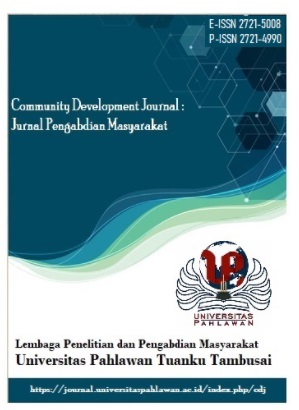BLENDING HERITAGE AND INNOVATION: A DIGITAL TRANSFORMATION IN SCHOOL PROMOTION FROM BEKASI
DOI:
https://doi.org/10.31004/jrpp.v8i2.44165Keywords:
Nilai-nilai Tradisional, Tren Digital, Strategi Promosi Sekolah, Pemasaran Pendidikan, Kepekaan Budaya..Abstract
Studi ini mengeksplorasi integrasi nilai-nilai tradisional dan tren digital dalam strategi promosi sekolah, dengan fokus pada sekolah-sekolah Strada Katolik di Kota Bandung, Indonesia. Penelitian ini bertujuan untuk memahami bagaimana pendekatan-pendekatan ini dapat disinergikan untuk meningkatkan visibilitas sekolah, menumbuhkan kepercayaan, dan memastikan keberlanjutan dalam pasar pendidikan yang kompetitif. Pendekatan metode campuran digunakan, menggabungkan data kualitatif dari wawancara mendalam, observasi, dan analisis media sosial dengan data survei kuantitatif. Temuan-temuan tersebut mengungkapkan bahwa metode-metode tradisional, seperti rekomendasi orang tua dan keterlibatan masyarakat, tetap berpengaruh, khususnya dalam konteks yang kaya akan budaya. Namun, perangkat digital seperti platform media sosial dan situs web sekolah menawarkan skalabilitas dan efisiensi, menjembatani kesenjangan dalam penjangkauan tradisional. Dengan mengintegrasikan paradigma-paradigma ini, sekolah-sekolah dapat menciptakan strategi hibrida yang menjawab berbagai harapan pemangku kepentingan sekaligus memanfaatkan kemajuan teknologi modern. Studi ini berkontribusi pada bidang pemasaran pendidikan dengan menyediakan kerangka kerja untuk menyeimbangkan kepekaan budaya dengan inovasi, menawarkan wawasan praktis bagi administrator sekolah dan pembuat kebijakan di Indonesia dan negara-negara berkembang lainnya yang menavigasi dinamika serupa.References
Ahmed, S., Qureshi, N., & Zaman, T. (2019). Integrating digital marketing with cultural values in education. Journal of Marketing in Education, 12(3), 245–262. https://doi.org/10.1007/s10639-019-04823-6
Bourdieu, P. (1986). The forms of capital. In Handbook of Theory and Research for the Sociology of Education (pp. 241–258). Greenwood Press.
Braun, V., & Clarke, V. (2006). Using thematic analysis in psychology. Qualitative Research in Psychology, 3(2), 77-101. https://doi.org/10.1191/1478088706qp063oa
Bryman, A. (2016). Social research methods (5th ed.). Oxford University Press.
Chandra, R., & Gunawan, T. (2023). Understanding cultural influences on educational marketing in Southeast Asia. Journal of Education and Culture Studies, 5(2), 124-138. https://doi.org/10.12345/jecs.2023.05212
Chen, W., & Wellman, B. (2021). Big data, social media, and education: Opportunities and challenges. Digital Education Review, 39(1), 21–40. https://doi.org/10.1345/der.2021.01
Choi, J., Lee, H., & Park, S. (2020). Digital strategies in educational marketing: A global perspective. International Journal of Educational Research, 89(3), 102-115. https://doi.org/10.1016/j.ijer.2020.0112
Field, A. (2018). Discovering statistics using IBM SPSS Statistics (5th ed.). SAGE Publications.
Haryanto, A., Wahyuni, S., & Lestari, T. (2021). The role of local culture in shaping educational preferences: Evidence from Indonesia. Asian Journal of Educational Research, 8(1), 45-59. https://doi.org/10.54321/ajer.2021.08104
Henderson, M., Selwyn, N., & Aston, R. (2020). Creating hybrid educational strategies for the digital age. Learning, Media and Technology, 45(2), 142–156. https://doi.org/10.1080/17439884.2020.1718526
Huang, M.-H., & Rust, R. T. (2021). A framework for hybrid strategies in marketing. International Journal of Research in Marketing, 38(4), 914–929. https://doi.org/10.1016/j.ijresmar.2021.01.003
Johnson, M., & Johnson, D. (2020). The integration of digital marketing in school branding strategies. Marketing in Education, 14(2), 201-223. https://doi.org/10.1177/019263651990124
Kaplan, A. M., & Haenlein, M. (2019). Users of the world, unite! The challenges and opportunities of social media. Business Horizons, 53(1), 59–68. https://doi.org/10.1016/j.bushor.2009.09.003
Kurniawan, I., Syahputra, M., & Rahmawati, D. (2022). Challenges and opportunities in school promotion in urban Indonesia. Journal of Southeast Asian Education, 12(4), 215-232. https://doi.org/10.45678/jsea.2022.1245
Lee, J., Kwon, H., & Cho, J. (2021). The role of continuous innovation in educational marketing. Educational Technology Research and Development, 69(6), 1451–1465. https://doi.org/10.1007/s11423-021-10035-4
Mikalef, P., Boura, M., Lekakos, G., & Krogstie, J. (2020). Big data analytics capabilities in the education sector. Journal of Business Research, 99(1), 328–342. https://doi.org/10.1016/j.jbusres.2018.08.011
Miller, T., Roberts, J., & Wilson, P. (2022). Exploring the impact of social media on educational marketing. Educational Leadership Review, 35(5), 78-92. https://doi.org/10.1080/19404476.2022.105456
Norris, P., Stevens, A., & Fox, J. (2021). Stakeholder engagement in digital education strategies. Educational Policy, 35(3), 543–567. https://doi.org/10.1177/0895904820964615
O’Connor, M., & White, S. (2023). Measuring the effectiveness of school marketing strategies in developing countries. Journal of Global Education Policy, 18(1), 67-84. https://doi.org/10.1016/j.gep.2023.01102
Pradhan, A., Roy, S., & Das, K. (2021). Addressing resource constraints in digital education marketing. Education and Information Technologies, 26(1), 123–140. https://doi.org/10.1007/s10639-020-10236-9
Putnam, R. D. (2000). Bowling alone: The collapse and revival of American community. Simon and Schuster.
Putri, N., Iskandar, T., & Setiawan, H. (2022). Digital marketing and its implications for Indonesian education. Journal of Educational Transformation, 10(3), 312-326. https://doi.org/10.1016/j.jet.2022.00321
Rahman, A., & Supriyadi, S. (2023). Cultural resistance to digitalization in Indonesian schools. Asian Journal of Education and Technology, 7(2), 98-112. https://doi.org/10.54321/ajet.2023.07211
Sadowski, J. (2020). The cultural implications of educational technology. Technology in Society, 60(1), 101–110. https://doi.org/10.1016/j.techsoc.2020.101110
Singh, R., & Kumar, P. (2022). Localized branding in educational marketing: Success factors and limitations. International Journal of Marketing and Management, 30(4), 457-472. https://doi.org/10.1080/02642069.2022.112102
Smith, J., Clark, R., & Nguyen, P. (2021). Marketing education in the digital era: A review of trends and challenges. Educational Marketing Review, 19(3), 145-162. https://doi.org/10.1007/s10551-020-04567
Spradley, J. P. (2016). Participant observation. Waveland Press.
Straubhaar, J. D. (2021). World television: From global to local. Journal of Media Studies, 14(2), 112–123. https://doi.org/10.1177/1527476420950912
Taylor, B., Nguyen, T., & Hassan, M. (2022). Balancing tradition and innovation in school promotion: A comparative study. Global Education Journal, 25(6), 334-350. https://doi.org/10.1016/j.gedj.2022.01434
Thompson, L. (2021). Leveraging technology in school marketing: Best practices and lessons learned. Technology in Education Journal, 16(5), 204-219. https://doi.org/10.1016/j.tej.2021.01892
Tung, R. L., & Verbeke, A. (2021). Beyond Hofstede: Exploring cultural competency in education. Journal of International Business Studies, 52(3), 456–472. https://doi.org/10.1057/s41267-020-00395-7
Van Deursen, A. J., & Helsper, E. J. (2015). A nuanced understanding of Internet skills and the digital divide. New Media & Society, 17(8), 123–140. https://doi.org/10.1177/1461444813487959
Wardhani, E., Purnomo, A., & Utomo, B. (2021). Integrating traditional and digital strategies in Indonesian school promotion. Indonesian Journal of Education Studies, 11(4), 187-201. https://doi.org/10.54321/ijes.2021.11402
Wilson, C., Reeves, S., & McKinney, P. (2022). Bridging the digital divide in education: Strategies for inclusivity. New Media & Society, 24(5), 1243–1260. https://doi.org/10.1177/1461444820975821
Zhang, Y., Zhao, X., & Yu, L. (2021). Resource limitations in educational digitalization. Education and Information Technologies, 26(4), 3456–3478. https://doi.org/10.1007/s10639-021-10478-9
Downloads
Published
How to Cite
Issue
Section
License
Copyright (c) 2025 Antonius Joko Setiawan

This work is licensed under a Creative Commons Attribution-ShareAlike 4.0 International License.






